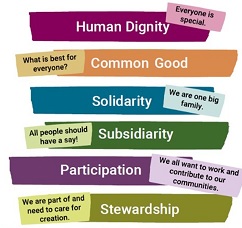Taxes are indispensable, but they must be fair and necessary. It is the responsibility of the State to uphold justice and order in society. Taxes are a way of supporting institutions devoted to these goals and contributing to the general well-being —the common good—, the primary reason for the existence of a government.
In some of his Epistles, St. Paul teaches the obligation to submit to civil authorities and to pay taxes, even when, despite the greatest of intentions, human activity —including the government— is fallible. Taxes are an expression of our social responsibility and our obligation to solidarity. In his letter to the Romans, he states: “Give to everyone what you owe them: If you owe taxes, pay taxes; if revenue, then revenue ...” (Rom.13,7)
 That is why one of the fundamental principles of the Church's Social Doctrine is SOLIDARITY because it exhorts us to contribute to the well-being of all, especially those most in need. Paying taxes is a concrete manifestation of this principle, even if we disagree with certain policies.
That is why one of the fundamental principles of the Church's Social Doctrine is SOLIDARITY because it exhorts us to contribute to the well-being of all, especially those most in need. Paying taxes is a concrete manifestation of this principle, even if we disagree with certain policies.
Of course, disagreement may reach a level of condemnation and rejection when it comes to funding with taxes activities, programs, and political ambitions that are radically opposed to Christian ethics and are discriminatory, unjust, and/or repressive. St. Thomas Aquinas teaches in the Summa Theologica: “... human law should not be obeyed" if it is "… a law that inflicts unjust hurt on its subjects” (S.Th., I-II, q.96, a.4 ad 2-3). Therefore, paying taxes does not imply our passive acceptance of all government decisions, however harmful, unjust or criminal they may be. We have the right and responsibility to question them, condemn them, and actively work to improve public policies, always in a constructive manner.
From a Catholic perspective, taxes necessary for the well-being and progress of society are an obligation that supports the COMMON GOOD and reflects our commitment to solidarity. Through dialogue and active engagement, we can improve society while still fulfilling our civic duties.
The Church's first great social encyclical, Rerum Novarum by Leo XIII (1891), already addresses this issue. As Domingo Sugranyes, head of the Seminar on Socioeconomic Ethics of the Paul VI Foundation, reminds us: "The social doctrine of the Church is not a manual. It does not deal with all the issues and those it does deal with are not done in a systematic and scientific way," but he adds that the Compendium published in 2005 addresses the issue of taxation in the chapter dedicated to economic institutions at the service of man. And he stresses that when it focuses on public finances it refers, first of all, to their role as an instrument of development and not as a means of redistribution. It is very important to recognize this. In other words, it does not accept socialist solutions because "just and efficient public finances must favor the growth of employment, support business activity, non-profit initiatives, and pension systems, and increase the credibility of the State as guarantor of pension systems and social protection. Fiscal activity must serve as a complement for the development of solidarity."
Consequently, although every citizen must comply with the moral obligations that derive from his status as a member of society, both in compliance with just laws and in the obligation to respond positively to the interests of public life, it must be recognized that political leaders increasingly invade the sphere of citizens' personal lives, legislating on aspects of "natural law", the value of the person, his dignity and his attributions, encouraging the criteria of utility and possession on the one hand and of convenience on the other as an electoral resource. Justice, from these criteria, is relativized and becomes a new social construct, subject to a selfish human convenience that is then determined by laws that adulterate the concepts of the common good and solidarity.
Does the control of the economy and money correspond to the State or this issue goes beyond State powers? Does this have to do with the Social Doctrine of the Church? Let us reflect on these questions and act accordingly in our environments.
Comments powered by CComment